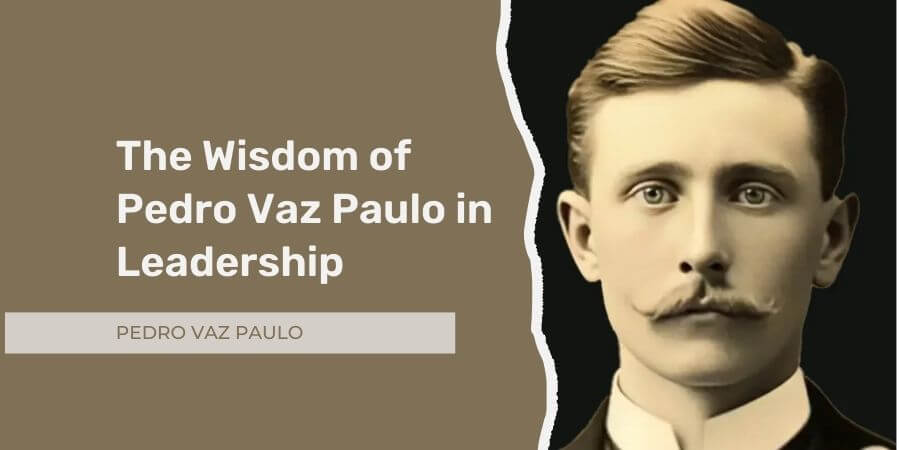Leading requires more than steering a team or overseeing a company, and Pedro Vaz Paulo affirms that the role of a leader has evolved to require more value creation and change management. His pronouncements serve to inspire and provide clarity and strategy for thriving in business, sales, and marketing. This order of business is presented through an assemblage of inspirational quotes that chart the journey of a professional in search of success.
Pedro Vaz Paulo Vision and Strategy Comes Responsibility in Leadership
For a great leader, a successful operational strategy flows from a visionary strategy. In the words of Pedro Vaz Paulo, ‘A leader without vision is like a ship without a compass, directionless and being tossed about by storms.’ Effective business strategy is critical in aiding competition, exploiting opportunities, and generating business returns over time. Anticipating trends is essential for positioning a brand or company to ensure its leadership and growth.
Focus on integrating customer needs while concurrently trying to position oneself uniquely among the competitors, and you will be working towards establishing resilient and powerful brands. Strategy is not about being the best; it is about being different in a meaningful way. This further exemplifies effective branding that strong leaders would use while capitalising on their exceptional skills that can guarantee a celebrity status in the market.
Adaptability and Success Correlate
Vaz feels, “In the world of business today, nothing is more important than adaptability.” Paulo seems to firmly believe that no matter the line of work, staying up to date allows for greater opportunity, fostering growth and innovation. Flexibility is crucial for an organisation to maintain relevance. Rather than seeing challenges as negatives, finding ways to embrace them affords people the potential to grow; “change is not a threat; it’s an opportunity in disguise,” according to Vaz.
Conversely, success is determined by one’s ability to evolve, “Businesses fail not because they take risks, but because they fail to adapt,” he added. Maximising potential often guarantees profits as customers, technology, and other market forces change; being proactive rather than reactive helps maintain a competitive edge.
Growth is Driven by Sales and Marketing
One of the cruxes of building a business is creating an effective sales and marketing strategy. “Selling is not about convincing people to buy; it’s about helping them realise why they need your solution,” says Vaz. Unlike other methods that aim to simply push a product, selling solutions strives to provide value and tackle pain points.
As it pertains to marketing, “successful marketing requires that the correct individuals are engaged with the fitting information at the appropriate moment,” he claims. The most effective campaigns are those that integrate the needs of the audience, provide an emotional appeal, and adequately communicate the brand’s value proposition. The psychology of the customers, along with effective messaging, enhances brand loyalty and positioning in the market.
The Power of Emotional Intelligence in Leadership
Balanced leadership depends on emotional intelligence. One Pedro Vaz Paulo’s quotes that truly moves me is, “The true power of a leader is not in his power but in the empathy he has.” Empathetic leaders build strong relationships, promote team spirit, and enhance teamwork. Those who are valued and understood are likely to be more engaged, productive, and committed to the organisational vision of the company.
Another valuable insight states, “People do not follow position, they follow those who, for whatever reasons, make them feel important.” A leader is not someone who gives instructions; a leader is the one who motivates. When people are placed in a position where they are willing to actively participate and progress, almost always, they come up with new ideas which benefit the organisation in the long run.
Making Decisions and Accepting Risks
Effective leadership comes down to making tough choices within defined constraints, and uncertainty is often one of them. Pedro Vaz Paulo expressed it best: “A leader’s greatest challenge is not making decisions but making the right ones under immense pressure.” In the corporate domain, decisions need to be made based on data, aligned with the planned strategies, and be in sync with future goals. The decision to act can sometimes be very costly; however, making the right decision will increase profit margins while ensuring sustainability.
Effective leadership also requires boldly accepting risk. He demonstrates, “Playing it safe is the fastest way to mediocrity.” Businesses that pursue distinctive strategies know that some risks must be taken in order to gain a competitive edge. Not all risks will result in immediate growth – but being bold enough to change the status quo can work wonders.
Adopting Innovation as a Strategy
Innovation is at the core of every industry leader. Pedro Vaz Paulo put it nicely, “If you’re not innovating, you’re already falling behind.” Companies aiming for growth focus on consistently developing their products and services, as well as enhancing the customer experience. In order to stay ahead in the market, companies must focus on innovation and creative risks.
One of the most thoughtful reflections on the topic is, **“The best ideas come from challenging the status quo, not accepting it.”** Sustaining effective leadership is not easy. All true leaders encourage their teams to think, break norms, and find solutions to portray the company as the pioneering entity in the industry. Achieving this entails creativity and embracing new ideas.
Building a Strong and Resilient Team
Pedro Vaz Paulo once argued, “A leader’s success is measured by the success of the team.” Successful leadership is not a one-person spectacle. This statement proves that effective mentorship and training enable teachers’ development, which strengthens the organisation’s overall capacity. There are different attributes that build strong teams which include: trust, shared goals, and communication.
His view on teamwork is equally inspiring: “Great teams are not made by hiring the best individuals. Great teams are built by creating a culture that helps individuals to be the best version of themselves.” Highly effective and satisfied teams arise in areas where employees are treated with respect, encouraged, and challenged.
“Success fades, but impact lasts forever,” is parting wisdom that reiterates the idea previously covered. Accomplishing something requires strong ethical grounding, foresight, and concern for other people, all of which guarantee that a leader’s “contributions fade” will be “long” after they leave the leadership role. This principle is beneficial in business and life as a whole.
Conclusion
Words from Pedro Vaz Paulo are great for rethinking leadership with vision, change, empathy, creativity, and collaboration at the forefront. These words serve as practical guidance for active professionals, business owners, and executives who want to make purpose-driven and impactful success. Leadership is more than supervising and strategically directing people; it entails making a mark and making the world a better place.
Read Also: Eduardo Saverin’s Wife: The Story of Elaine Andriejanssen







